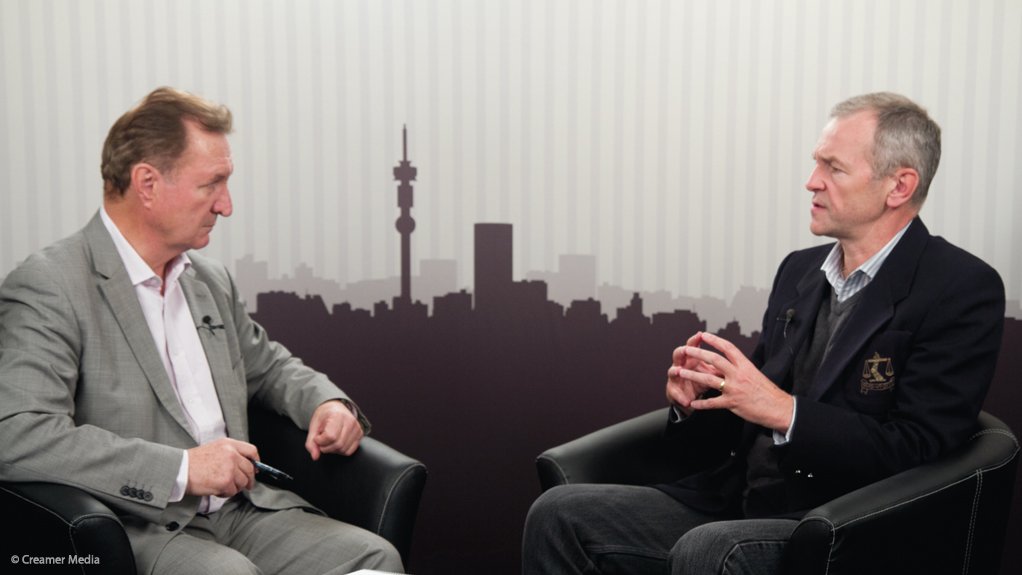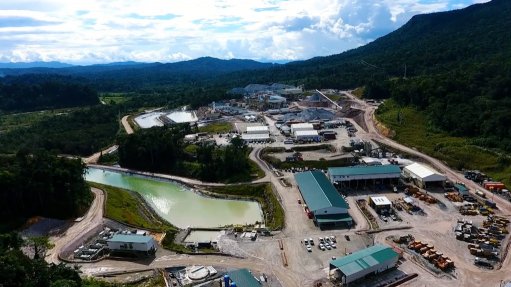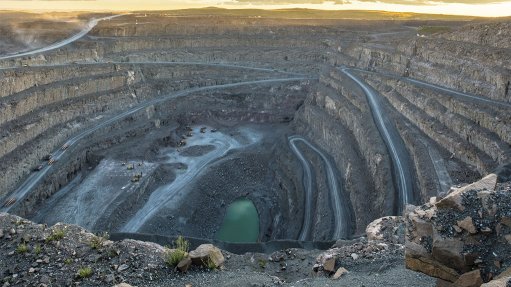First 4 000 calls come in for R5bn owed to 200 000 ex-mineworkers


Teba Limited CEO Graham Herbert and financial services manager Thabo Gumbi talk to Mining Weekly Online's Martin Creamer on their progress in tracking down 200 000 former mineworkers who are owed R5-billion in unpaid benefits. Photographs: Duane Daws. Video and Video Editing: Darlene Creamer
Teba CEO Graham Herbert (right) and Martin Creamer
Photo by Duane Daws
JOHANNESBURG (miningweekly.com) – A call centre established in Johannesburg has received 4 000 calls in the last four weeks from former mineworkers wanting to collect their share of R5-billion in unpaid provident fund, occupational disease and service-award claims.
Teba Limited CEO Graham Herbert tells Mining Weekly Online in the attached video interview that Teba has sparked the response through conducting a comprehensive trial radio campaign in the Eastern Cape, primarily targeting the beneficiaries of the Mines 1970s Pension and Provident Fund.
Some 200 000 ex-mineworkers have unpaid claims, which the 112-year-old Teba – headed by executive chairperson Dr James Motlatsi, a former 40c-a-shift mineworker and founding president of the National Union of Mineworkers – is able to validate using its a database of more than 1.5-million records, which also show where the ex-mineworkers live.
The long-standing Teba business, which recruits and manages both local and foreign labour for the mining industry, created the call centre with the help of other mining-industry stakeholders, to dovetail with the radio campaign.
“The response to that has been overwhelming,” says Herbert, who estimates that there are probably three times more unemployed former mineworkers than there are current mineworkers.
When a respondent walks into any one of Teba’s 15 offices in the Eastern Cape, the company is able to make online checks against the person’s identification and other identifying fields of information to see if they may also be owed money by funds other than the Mines 1970s Pension and Provident Fund.
The Eastern Cape has been chosen for the trial because of its being the source of a large number of mineworkers over the years.
Teba financial services manager Thabo Gumbi expects to dent the R5-billion significantly, provided current industry alignment is sustainable over a period of time.
“We can come out with a result that will achieve a significant socioeconomic upliftment of the communities in the next three years,” Gumbi believes.
Whereas previously Teba would typically rely on cases to be supplied to it for tracing, it has come to realise that the time, effort and investment of that approach will not deliver the desired results.
“We believe that by reaching out to the people and creating the demand, the masses can be drawn in and their claims verified using the resources at Teba’s disposal,” Gumbi says.
In running the pilot, Teba is working closely with South Africa’s Chamber of Mines, one of the funds and data suppliers.
“There’s a lot of expectation being created through this initiative and we want to, as far as possible, meet that expectation and not create additional frustration within those communities,” Herbert cautions.
“Our walk-in centres have people who understand the shortcomings and can help individuals to complete the forms or better articulate the requirements,” adds Gumbi.
At a conference in February hosted by the Southern Africa Trust, the Ford Foundation and the Southern Africa Miners Association, Southern Africa Trust consultant Dr Mathais Nyenti called for the formulation of a strategy to improve the portability of social security benefits of migrant mineworkers.
Nyenti said the R5-billion in benefits owed to former migrant workers included an estimated R3-billion owed by the Mineworkers Provident Fund, while the Mines 1970s Pension and Provident Funds owed R200-million, the Sentinel Mining Industry Retirement Fund owed about R101-million and the Living Hands Umbrella Trust had lost R1.2-billion in the Fidentia scandal.
Further, the Department of Labour’s Compensation Commissioner for Occupational Diseases currently had a backlog of 18 000 claims, with up to 274 400 former mineworkers still to receive their benefits, while its Compensation Fund still had about 12 000 unpaid claimants.
“It’s clear that a large number of people still need to receive their benefits and, therefore, it is imperative that something be done to assist these people,” he stated at the time.
With consultant Professor George Mpedi, Nyenti conducted a scoping study in 2013 on behalf of the Southern Africa Trust, on the challenges experienced by former mineworkers in selected Southern African countries relating to the portability of social security benefits.
Through the study they identified the main challenges faced by migrant workers in accessing the benefits owed to them.
“Former mineworkers are faced by daunting social, structural, policy or regulatory, administrative and institutional obstacles,” Mpedi told the conference.
He cited migrants’ or dependants’ lack of information on access rights, procedures and administrative formalities, the impact of South African immigration law, the absence of portability or limited portability arrangements in South African social security laws and a lack of institutional capacity.
He alleged that there was also a lack of administrative cooperation between various schemes, delays in payment of benefits and professional occupational health services were often inaccessible to the former workers.
Further, delivery was being hampered by differences in national banking systems, a weak Southern Africa Development Community regional framework for occupational injury and disease protection, and the limited application of international standards in relevant countries.
He claimed that the scoping study also found that the South African government and social security institutions were reluctant to disburse benefits properly to former migrant workers.
Depending on how well the outreach works in the Eastern Cape, Teba would like to roll it out to all its other offices in labour-sending areas.
“It’s cheaper, of course, to just phone the call centre, so that’s why we gave people that opportunity on the radio campaign.
“Unemployed mineworkers don’t really have facilities through which they can make enquiries and advance their needs. That perception change is an important one that people should now see Teba offices as community resource centres,” Herbert says, giving the reason why Teba has failed to do this in the past as lack of role-player alignment.
“We’re now at a point where we feel there is sufficient alignment in the industry between all the role-players for us to go out and make this test case, which on the basis of one month seems to be going quite well,” he adds.
Disabled or sick former mineworkers can potentially gain upwards of R500 000 each and provident fund payouts for 10 to 15 years’ service can amount to hundreds of thousands of rands apiece.
Research shows, however, that at least half of the 200 000 are unaware that money is owed to them, despite having valid, uncontested claims.
Of those who are aware, some undertake long-distance journeys to the institutions representing these funds while others, often out of desperation, accept help from third parties, who have been known to pocket more than half of the value of the settlements.
The many long-service claims that predate the provident fund era are problematic as they tend to be of less value than the cost of tracing the claimants.
However, changes to the Pensions Fund Act now allow for a proportion of the interest that has been accruing on the claims to go towards tracing costs.
If the current unsuccessful disbursement methods are continued, however, the already large financial backlog is set to grow even larger.
Teba is already dealing with the Medical Bureau for Occupational Diseases in tracing 200 000 mineworkers with assessed lung damage, so that they can be paid the money owed to them, and is also managing the search for mainly former gold and coal mineworkers who have outstanding claims under the old shift-linked long-service Chamber of Mines awards that predate the provident fund era.
Southern Africa Trust deputy executive director Dr Bheki Moyo has told Mining Weekly Online that it is the absence of correct documentation and the lack of awareness of proper procedures that was standing in the way of 500 000 mainly Mozambique, Lesotho and Swaziland former migrants receiving what the trust estimated to be R6-billion in undisbursed funds.
The eight-year-old Southern Africa Trust, which has a mandate to eradicate regional poverty, estimated that R3-billion of the R6-billion was in the hands of the Mineworkers Provident Fund.
Comments
Press Office
Announcements
What's On
Subscribe to improve your user experience...
Option 1 (equivalent of R125 a month):
Receive a weekly copy of Creamer Media's Engineering News & Mining Weekly magazine
(print copy for those in South Africa and e-magazine for those outside of South Africa)
Receive daily email newsletters
Access to full search results
Access archive of magazine back copies
Access to Projects in Progress
Access to ONE Research Report of your choice in PDF format
Option 2 (equivalent of R375 a month):
All benefits from Option 1
PLUS
Access to Creamer Media's Research Channel Africa for ALL Research Reports, in PDF format, on various industrial and mining sectors
including Electricity; Water; Energy Transition; Hydrogen; Roads, Rail and Ports; Coal; Gold; Platinum; Battery Metals; etc.
Already a subscriber?
Forgotten your password?
Receive weekly copy of Creamer Media's Engineering News & Mining Weekly magazine (print copy for those in South Africa and e-magazine for those outside of South Africa)
➕
Recieve daily email newsletters
➕
Access to full search results
➕
Access archive of magazine back copies
➕
Access to Projects in Progress
➕
Access to ONE Research Report of your choice in PDF format
RESEARCH CHANNEL AFRICA
R4500 (equivalent of R375 a month)
SUBSCRIBEAll benefits from Option 1
➕
Access to Creamer Media's Research Channel Africa for ALL Research Reports on various industrial and mining sectors, in PDF format, including on:
Electricity
➕
Water
➕
Energy Transition
➕
Hydrogen
➕
Roads, Rail and Ports
➕
Coal
➕
Gold
➕
Platinum
➕
Battery Metals
➕
etc.
Receive all benefits from Option 1 or Option 2 delivered to numerous people at your company
➕
Multiple User names and Passwords for simultaneous log-ins
➕
Intranet integration access to all in your organisation




















